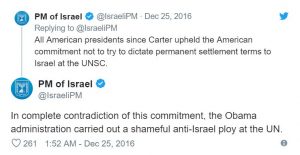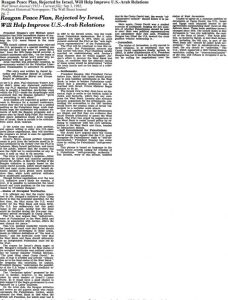President Dwight D. Eisenhower Speech (1957)
In radio and television speech, President Dwight D. Eisenhower addressed the people of the United States and explained to them the current situation in the Middle East in order to build public support for the Eisenhower Doctrine, a congressional bill that would authorize the U.S. deployment of troops to any Middle Eastern state that wanted protection from Communism. In the speech, Eisenhower was highly critical of Israel, and demanded that Israel, Britain, and France, end their invasion of Egypt and leave the Suez Canal. The speech was really meant for the Arab States, as it was a way of showing that the United States respected the sovereignty of Arab States. The speech is critical in understanding the history of the relationship between the United States and Israel because it shows U.S. priorities in the Middle East. The United States prioritized building strong relationships with Arab States in order to win the Cold War against the Soviet Union over its present relationship with Israel. The speech was spoken by Eisenhower, from the Oval Office, for all Americans with a television or radio to hear.
Prime Minister Netanyahu’s Twitter Posts (December 25th, 2016)

The Prime Minister of Israel, Benjamin Netanyahu, was infuriated when the United States abstained from a vote by the United Nations Security Council on whether to pass a resolution condemning Israel on the issue of settlements. Netanyahu saw the decision to abstain from voting as the ultimate betrayal by the United States, and he took to twitter to vocalize his disappointment. Netanyahu used his disappointment to inspire political backlash against the Obama Administration which had made the decision to abstain. The tweet is important to the history between the United States and Israel because it emphasizes the mutual disapproval between the Obama Administration of the United States and the Netanyahu Administration in Israel. Netanyahu used the tweet as a rallying cry for Americans who unapologetically defended Israel to criticize the Obama Administration.
“Reagan Peace Plan, Rejected by Israel, Will Help Improve U.S.-Arab Relations.” article by David Ignatius and Jonathon Spivak.(Sep. 3, 1982)

This newspaper article explains how the Reagan Administration had attempted to foster peace in the Middle East. The authors, David Ignatius and Jonathon Spivak, explain that the plan required Israel to stop building settlements, though Israel refused, and rejected the plan. The article describes how the United States hoped that self-governance would be established for the Palestinians, and how the self-governance would lead to peace. When analyzing the relationship between the United States and Israel, this plan shows the conflicting priorities of the two countries. The plan underlines the continued attempts by the United States to develop stronger ties with Arab States to gain an edge over the Soviet Union in the Cold War. Meanwhile, the priorities of the Israeli government continue to be increasing the settlements in disputed territories. The Wall Street Journal article accentuates how the interests of the Israeli and American governments have diverged, leading to a fracturing relationship.
